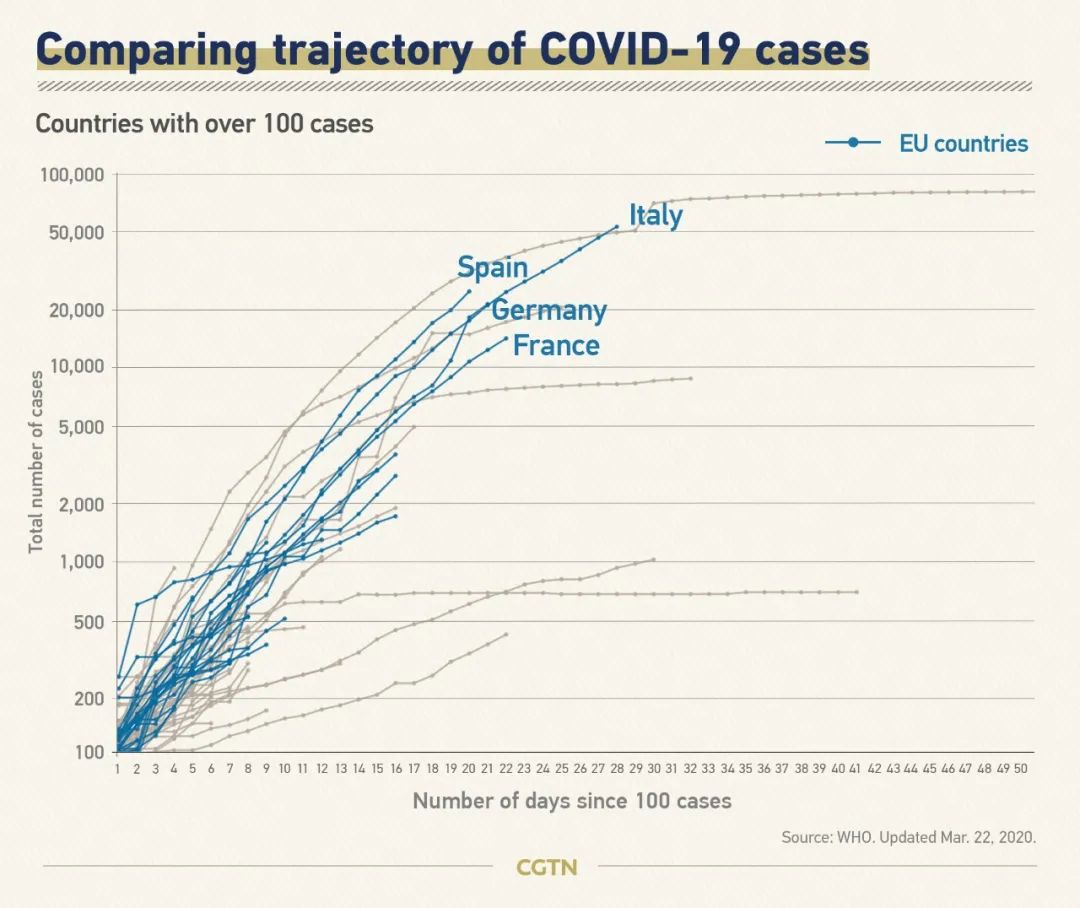新东方网>英语>英语学习>英语阅读>双语新闻>时政热点>正文
欧洲疫情最新消息:欧洲疫情最严重的几个国家如何“战疫”?
2020-03-26 14:57
来源:CGTN
作者:CGTN
In an unprecedented move, the European Union approved a 30-day ban for non-essential travel from outside the bloc to halt the spread of the virus. Member countries also unilaterally imposed full or partial border closures.
On March 16, the Spanish government announced the closing of its land borders. Effective March 17, Germany shut down its borders with France, Switzerland, Austria, Denmark and Luxembourg.
Such moves were rare for the border-free Schengen area, where free travel was always a cherished principle.
它们有多有效? 这取决于执行的严格程度。 意大利现在是世界上受疫情影响最严重的国家,也是第一个在欧洲采取全面封锁措施的国家。 1月31日,意大利政府宣布进入紧急状态,原因是该国最初两例新冠肺炎病例在罗马得到确诊。 然而,自2月下旬以来,确诊病例数呈指数级增长,死亡人数几百人地增加,政府的封锁力度似乎呈现滞后性。
How effective are they?
It depends on how strictly they are enforced.
Italy – now the most-hit country in the world – was, in fact, the first to respond with sweeping measures in Europe.
On January 31, the Italian government declared a state of emergency as the country's first two cases were confirmed in Rome.
However, number of cases grew exponentially since late February, and the death toll rose by hundreds. The government's paced lockdown seemed to always lag behind.

意大利卫生部门列举了高死亡率背后的各种原因,关键原因之一是人口老龄化,老年人特别容易感染此类病毒并产生并发症。其二是因为早期检测不充分,导致病例大量增长,使得医疗系统过度紧张。 另一个主要原因也可能是一些意大利人没有认真对待全国隔离,正如中国红十字会副会长孙硕鹏在访问受灾最严重的城市米兰后所说,意大利实施全国范围的隔离后,当地人仍在四处走动,乘坐公共交通工具,前往酒店吃饭,这些情况令他感到很震惊。 自从世界卫生组织宣布欧洲为新冠肺炎的新爆发中心以来,欧洲新增病例和死亡人数的报告进一步加速,没有任何减弱的迹象。 尽管防控措施需要付出的代价巨大,但仍有必要采取更严厉的措施。 意大利的经验告诉我们,应尽早采取隔离措施,只有严格执行这些措施,才能真正遏制传染源并抑制病毒的传播链。
Health authorities have cited a variety of reasons for Italy's high toll. Key among them is its large elderly population, who are particularly susceptible to serious complications from the virus; insufficient testing at the early stage; and the over-stretched health system due to the influx of patients.
Another major reason could be that some Italians failed to take the national lockdown seriously, as pointed out by the leader of a delegation from the Chinese Red Cross after a visit to the hard-hit city of Milan.
Sun Shuopeng said he was shocked to see so many people walking around, using public transportation and eating out in hotels after the nationwide quarantine was imposed.
Since Europe was announced as the new epicenter of the COVID-19 pandemic by the World Health Organization, reports of new cases and deaths in Europe further accelerated, with no sign of abating.
Tougher measures are needed despite their huge costs.
Italy's experience tells that the restrictive measures should be launched early, and only by the strict implementation can they really contain the sources of infection and break the chains of transmission.







